Peter MALONE
Saturday, 09 October 2021 13:03
Days of the Bagnold Summer

DAYS OF THE BAGNOLD SUMMER
UK, 2019, 86 minutes, Colour.
Monica Dolan, Earl Cave, Rob Brydon, Tamsin Grieg, Alice Lowe, Elliot Speller Gillett.
Directed by Simon Bird.
Daniel Bagnold, aged 15, was not expecting to spend his summer holiday at home in the suburbs with his divorced mother, Sue. He was all ready to go to Florida to join his father who had left the family several years earlier and is now married, living in America, expecting a child with his young wife. Bags packed. Phone call. Don’t come at this time…
So, this turns out to be a variation on family drama, taking place in the suburbs. It is the story of Daniel. It is the story of Sue. A great deal of the impact of the film, in its low-key way, comes from performances by Monica Dolan (The Dig, and one of Alan Bennett’s dramatic television monologues, Talking Heads). She seems the perfect embodiment of the middle-aged woman, her husband having left her, still puzzling about that, trying to communicate with her 15-year-old son who is moody, to say the least, holding down a librarian’s job, some happy supportive chats with her sister.
And Daniel is played by Earl Cave (who looks very much like a younger version of his father, Nick Cave). He is lanky, lounges about, long hair, listening to rock music, and frustrated with his mother and his not being able to go to the United States (idealising without realising the truth the importance of his father in his life).
The behaviour of mother and son limits the action of the film which is rather episodic. Sue takes Earl to the mall to buy the shoes, they eat ice creams, at home Daniel continues to frustrate his mother. Sue on the other hand encounters another teacher from school, Doug, Rob Brydon, who invites her out on a date. A lot of excitement there but is there any future in it…? Then there is a mother of one of Earl’s friends who is into new age, massage, psychological advice. (She is played by Tamsin Grieg who also appears in one of Alan Bennett’s Talking Heads.)
There is an amusing little subplot where Earl finds an advertisement asking for a singer for a band which operates from a garage – and, when he turns up, they are all 10 year olds!
This summer holiday is a film that will appeal more to the adult audience, the parent audience, who can resonate with what Sue has experienced and is going through, especially towards the end when she and Daniel go to a restaurant to celebrate her birthday and Daniel is very gallant to protect her when he sees Doug on a date, repeating the routine he used with Sue. Probably safe to say that an audience of Daniel’s peers might be curious about seeing Earl and what is up to but not enough to sit through the whole film!
Probably ideal for those morning screenings at a local cinema followed by a nice morning tea or lunch.
1. The title? The memories of nostalgic British films? In fact, the contrast with the contemporary story? And the irony of the suburban Bagnold summer?
2. The suburban settings, the house and its interiors, upstairs? The streets? Neighbouring houses and visits? The garage with the band? The shopping malls? The restaurants? The musical score? The hard rock? The old popular songs?
3. The film for a British audience? Audiences familiar with British life? For an older audience identifying with Sue? Any appeal for audiences identifying with Daniel? The mother-son situation? The absent father? The son at age 15 and divided loyalties?
4. The portrait of Sue, her age, personality, bright, lacking in self-confidence, her work at the library, day by day, with the children? Her marriage, her husband leaving her, marrying a younger wife, expecting a child? Her relationship with Daniel, coping with his surliness, taking him shopping, the meals, his music and room? His moods? His criticisms? Yet helping him, the meal and the outings for her birthday? Phone calls from her husband? The situation of the Florida holiday being called off? The encounter with Mr Porter, his charm, the phone number, going out, the meal, the attempted kiss? No further contact? Seeing him in the restaurant with another woman, her reaction? Her sister’s visits, their talking together, sharing confidences?
5. Daniel, age 15, tall and gaunt, long hair, hard rock music, his room and the posters, the summer break, his memories of his father, looking forward to going to Florida, the phone call, his not being able to go? The tensions with his mother? Taunting her? Yet her going shopping for shoes…? His friendship with Ky, visits, sharing, the unexpected break? His mother wanting him to get a summer job, the notices, his CV, not being accepted? The note about the band, discovering it was young boys? Later going back, singing, an audition, their discussions and decisions? Final reunion with Ky, all with the band?
6. Ky’s mother, new age attitudes, the episode with a massage and Sue bursting into tears, her continued friendship, advice?
7. Sue’s sister and daughter, their visits, the two sisters comfortable together, Frank, discussions, support?
8. Doug, teacher, in the library, charm, exchanging numbers, going out with Sue, his charm at the meal, the effect on her, trimming her hair, opening the blouse…? The taxi, his kissing, the promise of contact? No contact? Daniel seeing him at the restaurant, trying to help his mother not see him, her confronting him?
9. The captions through the film, the early days, salad days, dog days, the later days?
10. The end, not a complete resolution, but the experiences of mother and son, the changes they experienced?
Published in Movie Reviews
Published in
Movie Reviews
Saturday, 09 October 2021 13:03
Til Kingdom Come
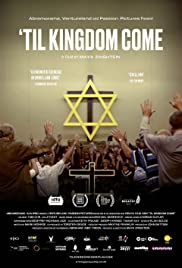
‘TIL KINGDOM COME
US, 2020, 76 minutes, Colour.
Directed by Maya Zinshtein.
This documentary was filmed during 2018, with a special focus on President Trump’s transferring the American Embassy to Israel from Tel Aviv to Jerusalem, the announcing of the President’s peace plan and the support of Benjamin Netanyahu, as well as delegations in Israel and to the United States of the leaders of Settler organisations.
This was the heyday of President Trump, flying high, relishing the attention, moving on the world stage. It also shows the range of religious advisors.
Seen in the light of President Trump’s defeat in the 2020 elections and the coming of the Biden administration, it is to be seen with quite a different perspective.
For some time, Americans and Israelis have been very conscious of movements of evangelical Christians in the United States in collaborating with Israel. The American perspective is very much Bible-based, a reading of the Old Testament, the Jewish Scriptures, with covenant promises, the triumph of the Jews, the defeat of their enemies. This ties in with the apocalyptic mentality of many evangelical Christians, conflicts, the tribulation, rapture, Armageddon.
This documentary focuses on a Jewish organisation and its founder, Echiel Eckstein, the International Fellowship of Christians and Jews, headquarters in Chicago and in Jerusalem, and his daughter, Yael Eckstein who succeeded her father. There are many interviews with father and daughter over the decades, public and political gatherings, Yael Eckstein and her travels around the United States, including a visit to Kentucky.
The documentary also focuses on a Baptist community in Kentucky, a dynasty of ministers, the Binghams, and their enthusiastic congregation, becoming involved in raising money for The Fellowship. The film is interspersed with interviews with the third and fourth Binghams in the dynasty, seeing them in action in their preaching, the younger man in his ordinary ministry with his flock, adults and children, the story of his cancer and healing, his visit to Israel and the Dead Sea as well as his discussion with a Lutheran minister in Bethlehem who is critical of the theology of the evangelical Christians and concerned about the fate of the Palestinians – with the younger Bingham saying he was not convinced, would believe the Scriptures, and that there was no such thing as a Palestinian.
This is a film which demonstrates very strongly the point of view of the members of the Fellowship, the enthusiastic meetings, social gatherings, political rallies, meetings of prominent evangelical pastors, especially Pat Robertson and his son, John Hague and other personalities on the President’s advisory board for religious issues. At many of the meetings, there are many Jewish Americans present, many of them affluent.
Clearly, as the film suggests with the introduction of the Lutheran minister with his critiques, with the gung ho enthusiasm of personalities who are promoting the settlements on the West Bank as the fulfilment of Scripture, with the enthusiastic Christians and their Pentecostal faith, audiences with a point of view will be reinforced in their point of view rather than being changed.
With the frequency of God language, the frequency of Jesus-language, ‘in Jesus name’, atheists will find it beyond belief! Christians who are not evangelical who do not share the fundamentalist interpretation of the Scriptures, will also feel that these interpretations are beyond belief.
One would like to interview the director as to why she included a final sequence with one of the Bingham ministers, face to camera, saying, unblushingly, that this was not the kind of thing he would say to Jewish people but then going into an enthusiastic tirade about the message of the Old Testament, the future of the Fellowship and his declaration the Jews would suddenly discover the Christian truth, be challenged and have to make decisions – suggesting that otherwise, hell could be a destination. Quite an ending to this documentary.
With the change of administration in the United States, with so many of the many religious advisors not having access to government and halls of power, the future of the Fellowship will be of great interest.
Published in Movie Reviews
Published in
Movie Reviews
Saturday, 09 October 2021 13:03
Dark Angel/ 2018

DARK ANGEL
US, 2018, 88 minutes, Colour.
Annalise Basso, Jason Priestley, Kelly Rutherford, Jason Cermak, James Rittingeer.
Directed by Paul Shapiro.
This is a second part of a trilogy of films for television based on the Casteel series of novels written by V.C .Andrews. It has a brief running time – a challenge to contain all the characters and ingredients of the novel under 90 minutes. Many of the fans of the novel were not impressed.
In the trilogy, the first of the films, Heaven, a young character is introduced, played by Annalise Basso. She has been brought up in the backwoods, a harsh kind of life. In this episode, she is summoned by her grandmother, who did not know she existed, to visit her. The grandmother, played in an extremely haughty style by Kelly Rutherford, has been married to a wealthy businessman, Tony Tatterton, played by Jason Priestley in an extraordinarily stiff performance, uttering his dialogue generally as if he were declaiming. The other main character in the story is Toni’s younger brother, Troy (Jason Cermak), a designer of toys for the business.
Heaven adapts very quickly to the affluent life, is sent to a prestigious school where she is mocked but achieves, over-achieves. Forbidden to see Tony’s brother, she does so, in a quite seductive manner, beginning a sexual relationship. This grows when her grandmother and Tony go on a luxury cruise. She claims to be 16, then 18.
Then the lurid aspects appear, the fact that Tony is in fact her father, seduced by her mother, which means that Troy is an uncle. And, there is more, though presented briefly and rather confusingly for the non-initiated, of her return to the backwoods, encountering her father, with memories of brutality, brothers, boyfriend of the time, and an abusive Reverend.
A curiosity item, an introduction to the themes of the novels of prolific writer V.C.Andrews (while not pleasing her fans).
Published in Movie Reviews
Published in
Movie Reviews
Saturday, 09 October 2021 13:03
Clark Sisters, The: First Ladies of the Gospel
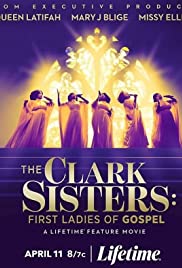
THE CLARK SISTERS: FIRST LADIES OF GOSPEL
US, 2020, 85 minutes, Colour.
Aunjanue Ellis, Christina Bell, Kierra Sheard, Shelea Fraser, Raven Goodwin, Angela Birchett, Demore Barnes.
Goodbye Christine Swanson.
The five Clark Sisters were a well-known group promoting Gospel songs, over 200 written by one of the group. They were established by their forceful mother, Mattie Moss Clark, who trained them, rehearsed them, controlled their business affairs. This brief film offers an overview of their lives, not without the audience reacting to the dominating mother, the daughters trying to find some autonomy. The family ministered in The Church of God in Christ.
Aunjanue Ellis gives a powerful performance as Mattie Moss Clark.
Many excerpts from their songs are included. While they tend to generic in God-language, there are references to Jesus, and in their home prayers, ‘In Jesus’ Name’ and, at one moment, ‘In darling Jesus’ name’. The sisters sang from the 1960s to the 1990s. They reunited in 2008 – a powerful force in US evangelical religious life.
1. The Clark sisters? Their reputation in the United States? Over the decades? Religious background? Gospel songs? Concerts, records, television?
2. The response of American audiences? American religious audiences? Outside the United States?
3. The sisters and their songs, compositions and arrangements by their mother, Twinky and her songs, the other sisters? The insertion of the songs throughout the film? Melodies, harmonies, piano and organ accompaniment, A Capella?
4. The personal story, 1963, Mattie Moss Clark, waking, her husband, waking the girls, at the piano, notes and harmonies? Indication of the talent of the girls? Indication of the pressures from the mother, her domination?
5. The outlining of the years, developments in the 1970s, careers in the 1980s, difficulties in the 1990s, reunion in 2008?
6. The church, God in Christ? Clark as the Minister, relying on his wife, her travelling for choirs, the brittleness between them, his demands, her unwillingness, not standing by him
at church meetings, his reaction to the girls, slapping his daughter? Mattie filing for divorce?
7. The character of Mattie Clark, music, always quoting motivations for God, ambitions, perfectionism, drive and domination? Her reactions with each of the girls? Relying on Jackie as the eldest? The interactions with Twinky, her compositions, playing the piano and organ, dependent on her mother? Denise and her ultimate rebellion? Mattie and her natty dressing, pillbox hats? Conducting choirs, treatment of the members, demanding? Recording studios? Intervening, praising? Her age, her daughters and possibilities for marriage, Jackie and her approval? The other daughters and going out, boyfriends?
8. The sisters working together, collaboration and the music, the songs, relationship with their mother, accepting her? Scenes at home, meals? Scenes of performance? Scenes of rehearsal? Collaboration over the decades?
9. The personal stories of the five daughters, the focus on Jackie, nursing, boyfriend, fiance, wedding? The screenplay not filling in the background is of the daughters, Twinky and her self-assertion, Denise and her self-assertion? 2008 and their marriages, children?
10. Mattie, older, getting sick, refusal to take the medication, eventually hospital, her death?
11. The funeral, Denise taking over, the reaction of the others, rifts in the family?
12. The reunion in 2008, subsequent success?
13. The religious perspective of the film, the language of God, alleluia, the repetition of “in Jesus�, a reference to “Darling Jesus�?
Published in Movie Reviews
Published in
Movie Reviews
Saturday, 09 October 2021 13:03
Ella

ELLA
Australia, 2016, 92 minutes, Colour.
Ella Havelka, Janna Havelka, David Mc Allister, Steven Heathcote, Stephen Page.
Directed by Douglas Watkin.
This is an interesting, entertaining and perceptive documentary.
The subject is a Ella Havelko, who was born in Dubbo in north-western New South Wales, living with her single mother, Janna, her father having left them and not making any contact but discovered to have a scrapbook about his daughter’s success. Ella went to dancing classes in Dubbo and her teacher recognised her talent.
So, this is a ballet documentary. It traces Ella’s moving from Dubbo to Melbourne when she was young, years of training as an apprentice with the Australian Ballet. Quite a lot of footage from Ella’s childhood at classes in Dubbo as well as material from the Australian Ballet are incorporated into the story. And, throughout the film, there is interview with Ella herself, a poised personality, answering all her questions, thoughtful about her life, opportunities, disappointments, success.
And, most significantly, Ella has an indigenous background – with images of her grandmother and marriage, interviews with her mother throughout the film. When Ella became a member of the Australian Ballet in 2012, it made headlines that she was the first indigenous dancer to become part of this Ballet.
However, very interestingly in terms of indigenous dance, when Ella did not become a dancer with the Australian Ballet, she was welcomed into the Bangarra Dance theatre troupe. Ella had to learn a different kind of dance, use of her body, different pressures on her limbs. There are quite a number of excerpts from Bangarra which will delight audiences.
Ella wanted to return to the Australian Ballet, was accepted back, discovered how different contemporary dance theatre styles were from ballet, severe physical re-training, some injuries and layups, disappointment in not being selected at first, a return to Dubbo for time with her mother, friends in Dubbo, and in some ballet instruction for the children there.
Ultimately, Ella becomes part of the Australian Ballet Troupe, goes on tour.
There are also the expected talking heads, very interesting, especially Ella’s mother, but also David Mc Allister, director of the Australian Ballet and former dancer and trainer, Steven Heathcote. And, from Bangarra, the director, Stephen Page.
Certainly of interest to audiences who like the Ballet, are interested in indigenous affairs, but well made to extend strong interest to wider audiences.
Published in Movie Reviews
Published in
Movie Reviews
Saturday, 09 October 2021 13:03
White Balloon, The
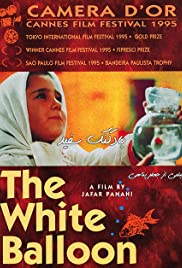
THE WHITE BALLOON
And, 1995, 83 minutes, Colour.
Aida Muhammadkhani.
Directed by Jafar Panahi.
In the 1990s, Iranian cinema had a very strong reputation worldwide. It had significant directors like a Abbas Kierostami and emerging directors like Majid Majidi and Jafar Panahi. Most of the films were comparatively small-scale, dramas, often in confined locations and, as with this film, a focus on young children. Majidi made Children of Heaven and Colour of Paradise.
The White Balloon is the first feature film, after documentary and short films, by Jafar Panahi who achieved international awards and acclaim during the 2000s. However, he clashed with the Iranian government, forbidden to make films for 20 years, under house arrest, but defying the authorities by finding ways to make small budget features and distribute them. And celebrated director, Abbas Kierostami produced this film.
It is a brief slice of life in Teheran, while there are sequences at home, much of the action is in the streets of the city and at the markets. We see family shopping, children playing, tailor, soldier, an old lady, snake charmers operating in the market.
However, the focus is on the seven-year-old girl who accompanies her mother to the market, as a special feast is announced on the radio. While they have fish at home in a bowl, the little girl is attracted to the fish at the market and continually asks her mother to buy some, the mother refusing. However, at home, with the mother very busy, the father present but having a clash with his son who has brought soap instead of shampoo, the mother gives in and gives the little girl some money. She accompanies her brother back to the market to buy the fish.
There are some episodes on the way, the encounter with the snake charmers who take her money but she is able to get it back. And then, she loses the money, it falling through a grate. And this is where people help her, and a boy with a white balloon, an Afghan refugee, helps with the recovery of the money, using a magnet tied onto his balloon.
The children get the money, buy the fish and run-off happily, forgetting all about the boy who helped them. However, they are children, not adults. So, the film is a portrait of young children, their charm, their whims, the self-preoccupation. (On the other hand, some commentators have seen it as a criticism of Iranian society and itself-preoccupation.)
1. The appeal of the film? Adults, children? Audiences identifying? Its classic status?
2. The reputations of the writer, the director? Uranian cinema in the 1990s?
3. Life in Teheran, the 1990s, the celebration of the feast, announcements on the radio, the market, the fish in the sales, family life, the vendors, life in the city? The musical score?
4. Razieh 7, audience response to the young actress, her vitality? Delighting in her? Yet her nagging, self-focus? Wanting the fish, continually asking? Her relationship with her parents, her father and criticisms? The mother being busy? Her brother? The fish at home, wanting the new fish? Getting the money? The encounter with the snake charmers, the taking of the money? The encounter with the tailor, the soldier, the old lady? Her help with the money? Razieh losing the money twice, recovery, down the drain? The Afghan boy, the balloons, the last balloon left, the white balloon, the magnet, getting the money back? The children running off without regard to the boy? The boy left alone with his balloon?
5. The realism of the story, the symbolism of the story? The children, self-centredness? The loan Afghan?
6. The market, vibrant, the many vendors, the mother in the shopping, Razieh and the fish, the various pleas? Going home, the continued tanking, her mother eventually giving in?
7. Her brother, his relationship with the father, the father snapping, throwing the soap, the buying of the shampoo, going with his sister to get the fish?
8. The various buying escapades, the snake charmers and their work, their personalities, the money, the range of ordinary people along the way of the escapade?
9. The great, the help, the boy with the balloon?
10. The children running away, the boy left?
Published in Movie Reviews
Published in
Movie Reviews
Saturday, 09 October 2021 13:03
Naomi's and Ely's No Kiss List
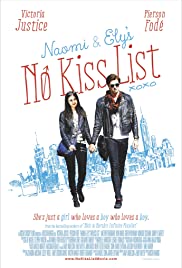
NAOMI’S AND ELY’S NO KISS LIST
US, 2014, 89 minutes, Colour.
Victoria Justice, Pearson Fode, Matthew Daddario, Ryan Ward, Griffin Newman, Monique Coleman, Danny Flaherty, Maddie Corman.
Directed by Kristin Hanggi.
This is a New York serious comedy about two young adults in New York City. They have been friends since childhood. They are played by Victoria justice, well-known from television as is Pearson Fode as Ely.
The two had prepared from their childhood a Kiss List, noting people that they did not want to have a relationship with. After leaving school, Ely comes out and is dating boys. While Naomi realises this, he is still her best friend, always confiding in him. She does try some of the dates, especially a young man who encounters Ely and they begin a relationship. Naomi attracts the attention of the young man near the apartment block where she lives as well as the doorman.
Here are two young adults adrift in New York, though Ely having more groundedness than Naomi. She remarks at one stage that they are young New Yorkers and don’t believe in anything. Will they by the end of the film – and afterwards?
1. The title? The two characters? A relationship? Issues of romance?
2. A film for young adults and teenage audiences, critics negative, family audiences positive? Dramatising issues for teenagers for discussion? American teenagers? Worldwide or not?
3. New York City, around Washington Square? Apartments, college, the streets, diners, clubs…? The musical score?
4. The story from Naomi’s point of view, her voice-over, her interpretation of her own experiences, of the lies?
5. Naomi’s comment about being 21st-century New York types, not believing in anything? The issue of moral behaviour, moral anchors, moral decisions?
6. Naomi, her age, her father walking out, her mother’s condition, behaviour in the apartment, Naomi caring for her, arguing with her? The long friendship with Eli, as children, as neighbours, sharing, interests? Going through school? College? Her behaviour in the class, the lecturer calling her out, the repetition at the end and her leaving to reconcile with Eli? Her friendship with Robin? At the library, setting up with the other Robin? Doing makeovers for her?
7. Ely, the long friendship with Naomi? His interests, tastes? His being gay? His parents, his mother’s affair, the gay marriage, the household? His being out, interest in boys, seeking out the company, comfortable?
8. Naomi and Eli his being gay, her knowing this but not accepting it?
9. Naomi attractive, Bruce I, memories of the past, the kisses, his always hanging about? The young boy in the foyer? Gabriel, his work is the doorman, playing in the band, the attraction to Naomi? Bruce II, at college, the dating, in his room, the sexual encounter, interrupted?
10. Eli, the encounter with Bruce, the attraction, the discussions, the kiss? The later meetings, Bruce coming out to his mother and her reaction? His hiding in Eli’s room? Bruce I spilling the news? Naomi and her reaction?
11. Naomi, upset, the attack on Eli, her confiding in Robin?
12. Halloween, clothes, picking out, dressing up, going out?
13. Naomi, dealing with her mother, facing the reality, having to face the reality about Eli? (And the lectures about Freud and the unconscious?) Her coming to her senses, arranging the meeting with Eli, the reconciliation?
14. 21st-century issues and relationships for teenagers?
Published in Movie Reviews
Published in
Movie Reviews
Saturday, 09 October 2021 13:03
Scandal in Sorrento
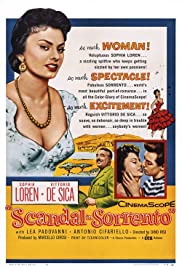
SCANDAL IN SORRENTO
Italy, 1955, 92 minutes, Colour.
Vittorio de Sica, Sophia Loren, Lea Padovani, Antonio Cifarielloshe, Tina Pica, Mario Coretenuto,.
Directed by Dino Risi.
This film was popular in its day, part of a trilogy starring Vittorio de Sica as a Marshal, debonair character, his duties in the town, and his relationship with the women, in the first two films, Bread, Love and Dreams, Frisky, with Gina Lollobrigida, directed by Luigi Commencini. This time, however, the lead is the very young Sophia Loren (who had appeared in many supporting roles since the late 1940s, including Quo Vadis, but now appearing in feature films, soon to go to Hollywood, winning an Oscar six years later under Vittorio De Sica’s direction for Two Women, and a successful career including a film directed by her son, Eduardo Ponti, the Life Ahead, released in 2020).
The main reason for seeing the film now part for its entertainment value, De Sica, the former matinee idol, then very serious director with Bicycle Thieves and Shoeshine, and seeing Sophia Loren aged 20. The film was directed by Dino Risi, director of many light Italian films including The Priest’s Wife, with Sophia Loren.
Netflix revived the film in 2020 and it is a beautiful print, drawing on the Cinemascope style as well as the bright colours of southern Italy.
1. A popular romantic comedy from Italy in the 1950s? The third in a trilogy?
2. The film seen in the retrospect of Vittorio De Sica’s acting and directing career, Sofia Loren’s career?
3. The colourful settings, the town and marketplace, trains, boats, the water, Sorrento, the jetty, the streets, the markets, homes and interiors, the nightclub? The musical score?
4. The title, expectations?
5. The focus on Antonio, his career, retiring, leaving the town, the priest and his advising him to reform, his relationship with Caramella, her bringing him up, housekeeper, taking her with him? The discussion on the train? On the boat?
6. Antonio, Vittorio de Sica, screen presence, manner, aplomb, cheerful? Conscious of his official dignity? His new position, municipal guards? His relationship with his brother, the priest, the discussions, his brother’s advice?
7. The introduction to Sofia, at the market, selling the fish, calling out, tough, her rivals, the little boy, the message for Antonio, her plan, the house, her relationship with Nico? Bringing the tray, meeting Antonio, some defiance, his liking her?
8. The plan to the house, Antonio and accommodation, Violante and her place in the house, her attraction towards Antonio, looking wistful?
9. Nico, postman, interactions with Sofia, her getting in the job, love, her slapping him, his wanting to move, to go to Venezuela?
10. Sofia, her relationship with Antonio, his infatuation, her plan? The outings together, her clothes and manner, walking the town, people’s response, the mayor and his counsel?
The engagement, going to the nightclub, persuading Antonio to dance, the encounter with Nico, the spilling the ice cream, leaving?
11. Antonio and his response to severe, Caramella and her advice? The comic touches of his behaviour in the town, the group coming to inspect the water, his hiding in the water?
12. Antonio realising the truth, meeting with Nico, the writing of the romantic letter, at the wharf, talking with Sofia about Antonio, her spurning him, his leaving, Antonio and his teasing Sofia, the boy bringing the letter, the reading it, her going to reconcile with Nico?
13. And Violante, still watching, playing the piano, Antonio and his brother and the advice, going to see Violante?
Published in Movie Reviews
Published in
Movie Reviews
Saturday, 09 October 2021 13:03
Trading Paint
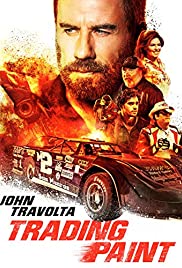
TRADING PAINT
US, 2019, 87 minutes, Colour.
John Travolta, Toby Sebastian, Shania Twain, Rosabell Laurenti Sellers, Kevin Dunn, Michael Madsen.
Directed by Karzan Kader.
Trading Paint is jargon amongst motor races. This film is set in Alabama, at the Talladega Raceway (the subject of humour from will Ferrell…).
There are quite a lot of racing sequences in the film which should please fans. However, the film is also a father-son relationship film. John Travolta plays the champion of the past. Toby Sebastian is his son, competing in the present, not quite successfully against past rival, played by Michael Madsen. The son is also married and has a young child. Travolta is a widower, his wife having been killed in a car accident, and the father not giving full attention to his son as he grew up.
The son goes to work with the rival, the rival inciting him to defeat his father. Travolta decides to race again, his son coming to work with him and there is a drama in the last two laps of a dramatic race.
More or less what might be expected from this kind of film.
1. Title? The jargon for racing, cars, competitiveness?
2. The Alabama setting, Talladega, the course, homes, garages, the countryside? The musical score?
3. Racing film, the racing sequences, the cars, speeds, lapse, dangers, crashes? The crowds and applause? Competitions? Results, champions, celebrations?
4. A father-son film, strained relationships, inadequacies of fathering, rebellion of sons? Possibilities for reconciliation?
5. John Travolta as Sam, looking grizzled? Is age? Past Championships? Relying on his son? Competitive against Linskey? Hostility? The race, cam and his car, failure to win?
6. The background of Sam, buying the car, love for his wife, in the car, the crash and her death? Visiting her grave? His commitment to racing? Neglect of his son?
7. Cam, memories of his mother, his father’s seeming lack of interest, his marrying, love for his wife, the baby? His reaction to the defeat? Hostility towards his father? Linskey and his approach, his agreeing, telling his father, his wife’s reaction, going to work, driving for Linskey?
8. The teacher, her coming to the town, the breakup of her marriage, friendship with Sam, dating, falling in love? Her support?
9. Sam deciding to race again, his reliance on his friends stumpy? Racing, Linskey urging Cam against his father? Sam winning, the celebration?
10. Cam, approaching his father, upset with Linskey and his advice? Returning to his father? Stumpy, the friend, the financial deal in buying the car, Stumpy putting in his bike? Getting the machine, working on it, the deadline to the race?
11. Sam wanting Cam to go in the car, the race, Linskey and his attack, two laps to go, Cam turning the car around, the speed, winning? The celebration?
12. The slowing of the pace, Stumpy telling his story, Sam saving his life, the debt of gratitude?
13. Happy ending, defeat of Linskey, father and son reconciled, Sam with the teacher, happy family?
Published in Movie Reviews
Published in
Movie Reviews
Saturday, 09 October 2021 13:03
El Diablo
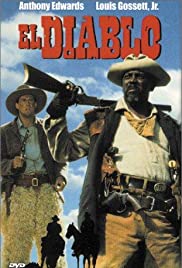
EL DIABLO
US, 1990, 116 minutes, Colour.
Anthony Edwards, Louis Gossett Jr, John Glover, Joe Pantoliano, Robert Beltran, M.C.Gainey, Miguel Sandoval, Sarah Trigger, Brancome Richmond.
Directed by Peter Markle.
Here is an enjoyable example of having one’s cake and eating it at the same time!
The basic plot line is familiar from many a Western, the abduction of a young woman from a town by Mexican bandit, the hero going in pursuit of her, aligning himself with gunfighters, tracking down the bandit, invading his hideout, shootouts. They are all there.
However, the plotting and the screenplay are very much tongue-in-cheek. The central hero who goes to rescue the abducted young woman is played by Anthony Edwards, a bespectacled young teacher from Boston, somewhat awkward in his manner, naive as well, a reader of the Western stories written by authors like Kid Durango. He has to learn how to fire a gun. His eyes are opened to the variety of types in the West. And yet… He teams up with a gunfighter, a black American gunfighter, played by Louis Gossett, quick on the draw, going on the quest with the teacher, instructing him, it being revealed that he is the source of so many of Kid Durango’s stories but unable to be identified as a black cowboy.
Kid Durango is played by Joe Pantoliano, an enjoyable performance, a somewhat effete long-haired type, eastern seaboard accent, with his typewriter in the West, sitting back and observing and writing the stories – though finally heroic the end.
There is a range of odd types who team up with the teacher and the gunfighter including a preacher played by John Glover. Robert Beltran is the title El Diablo.
And the screenplay was written by horror writer, John Carpenter, whose decade was the 80s with The Thing, Escape from New York. His co-screenwriter hears Tommy Lee Wallace who wrote and directed the third of the Halloween films.
1. The title? The Mexican bandit? His intervention in the town, the abduction, the confrontation?
2. Popular Western stories? The books, the legends of the West? Serious tongue-in-cheek?
3. The screenplay, contribution by John Carpenter in the light of his career and horror films? The serious plotline? The humorous, tongue-in-cheek aspects? Parody? The wit of the dialogue? Creation of characters, placing them in difficult situations, twisting the expectations?
4. The story of Billy Ray, from Boston, age, experience, proper, wearing spectacles, teaching at the school, his place in the town? His fondness for reading Kid Durango books? Getting ready for school, accompanying Nettie, the attraction, the classroom and classes?
5. The group arriving in town, El Diablo, arrogance, his men, the attack, the violence, his abducting Nettie? Billy Ray trying to stop him? Getting his spur? Carrying it is an emblem?
6. The presence of Van Leek, the black cowboy, gunfighter, his skills, manner and style? Teaming up with Billy Ray, the plan for the rescue of Nettie?
7. The character of Van Leek, his stories about his exploits? Trying to teach Billy Ray? Arriving at the town, the bar, the encounter with Truman, the discovery that he was Kid Durango? His typewriter?
8. Truman, rather effete in his manner, writing his stories, going on research, yet comfortable, friendship with Van Leek? Using his stories? Van Leek’s reaction, a white cowboy instead of a black cowboy?
9. The various encounters along the way, criminals, shootouts, the Preacher and the hangings, all joining Van Leek? The attitudes towards Billy Ray?
10. Billy Ray, his determination, yet apprehensions? The confrontations, the shootouts? His learning to shoot?
11. Into Mexico, El Diablo and his men, the shootings? Truman and his fear, saving Billy Ray, please that he was doing a noble thing?
12. Entering into the town, Nettie and her being with El Diablo, Billy Ray and his frustrations?
13. Going through the tunnel, the encounter with El Diablo, his laughing at Billy Ray? Van Leek’s arrival, the confrontation, Van Leek wounded, Billy Ray shooting El Diablo in the back? The comment about that was the way he was facing?
14. Rescuing Nettie, her return, reunited with her mother, thanks to Billy Ray? His becoming a Western hero? And his writing novels?
Published in Movie Reviews
Published in
Movie Reviews